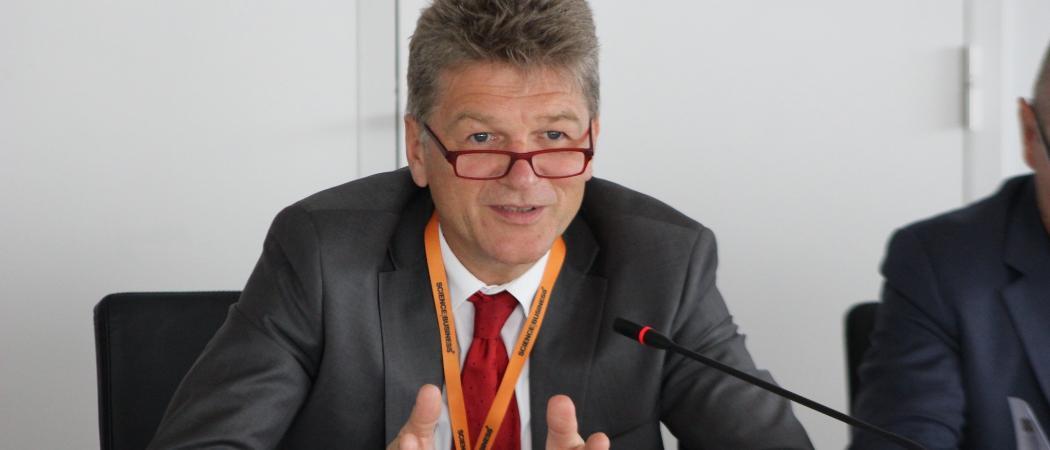Money will be channelled from Horizon 2020 to fund projects that enable industry to be better prepared for the next major shock, a Science|Business webinar hears

Peter Dröll, director for industrial technologies at the European Commission. Photo: Science|Business.
The European Commission is releasing €50 million from the Horizon 2020 research budget to help the manufacturing sector repurpose production lines faster, and is preparing a call worth €20 million dedicated exclusively to switching existing lines over to the manufacture of medical equipment, vaccines and diagnostics.
A further €30 million will be dedicated to digital innovation hubs and artificial intelligence for manufacturing, to speed up the digitisation of industrial production.
Peter Dröll, director for industrial technologies at the European Commission’s research and innovation directorate general, told a Science|Business webinar on Wednesday that the new funding will be announced “hopefully this week.”
“We know our production needs are tremendous and our manufacturing capabilities are not capable of meeting these demands,” Droll said.
As COVID-19 began spreading across Europe, member states soon realised they were largely dependent on supplies of protective equipment and testing kits manufactured in China. Some countries managed to repurpose manufacturing to reduce their dependence on fractured global supply chains. But if producing basic equipment such as masks and gowns is a challenge, “Imagine what we will need to produce once we have a vaccine,” Droll said.
The commission is working under the assumption that the coronavirus pandemic will not be the last shock Europe faces in the future, and the new Horizon 2020 projects will help manufacturing companies prepare better for the next major economic disruption.
“Our concern is that this will not be the last shock,” said Droll. “We need to move to a more flexible, agile manufacturing system.”
How companies can adapt
Some companies, particularly those with strong R&D departments, are weathering the storm better than others. The 3D printing arm of HP, headquartered in Barcelona, shifted its entire production chain to manufacture medical protection equipment in a matter of a few weeks. It now produces parts for mechanical respirators and swabs for coronavirus tests, after one of Europe’s largest supplier of swabs had to shut down production due to lockdown measures imposed by the Italian government.
“It is a great example of pivoting supply chains and be able to do something totally different,” said Ramon Pastor, vice president and general manager of HP 3D Printing Business.
But most companies were “not prepared for supply and demand being disrupted at the same time,” said Julia Arlinghaus, director at the Fraunhofer Institute for Factory Operation and Automation. First, companies were disrupted as lockdowns came into force and stifled supply chains, but then they faced the even bigger problem of plummeting demand. Research done by Fraunhofer suggests companies will see sales going down up to 30 per cent and bankruptcies increase by 25 per cent. In such dire conditions, “[small] companies do not have the power to invest in better risk management,” Arlinghaus said.
To reduce production costs, increase efficiency and repurpose their manufacturing capabilities effectively, cash-strapped companies will need to implement new technologies in their production chains.
But, according to Pastor, the main hurdle to a fast and effective repurposing strategy is not technology, but adoption. A lot of small and medium sized companies are not aware that many technologies needed are on hand already.
More research is needed to figure out how companies can make use of them, said Arlinghaus. “We need more research on linking different technologies and applying [them] in company specific contexts,” she said.
Recovery package
Even if companies are able to repurpose their manufacturing, that doesn’t mean they will have enough money to keep themselves afloat and invest in new technologies at the same time.
Pastor called on national and EU policy makers to continue to provide financing to the companies that need it and help them make capital investments in new technologies.
The commission is set to put forward a recovery package soon, which is likely to be announced together with a new proposal for the EU’s multiannual budget coming into force in January 2021.
According to Droll, the recovery package will focus on the EU’s double transition to a digital and greener economy, as a way to come out of the crisis set in motion by the COVID-19 pandemic. “[The recovery] will not be at the expense of the important transition and transformations we need,” he said.
Over the summer, the commission will also open a new call for research and innovation projects that contribute to the economic recovery, with some of the new technologies and business models Europe needs to transition to a green economy, Droll said.
Industrial partnerships
The commission is also in the thick of designing some 40 industrial partnerships which are to be rolled out in January as part of Horizon Europe. Some of these partnerships, Droll said, will contribute to the commission’s ambition to keep technological leadership in manufacturing, which is “super important for economy and for our society.”
One of these partnerships, the ‘Made in Europe’ strategy, is specifically aimed at helping companies find the tools they need to become more resilient to economic shocks and less exposed to supply chain interruptions.
The commission will publish the detailed research and innovation agendas of these partnerships by the end of May, said Droll.
In April, EU commissioner for research and innovation Mariya Gabriel told MEPs that the commission was weighing whether it needs an additional partnership on pandemic preparedness and societal resilience.
But, according to Droll, even if the commission decides to set up the pandemics partnership, it will not launch it in the first two years of Horizon Europe, and it will do so only after member states agree on a common strategy for dealing with future health crises. “[We] came to [the] conclusion that [the current partnerships] cover quite well [the coronavirus pandemic],” said Droll.





 A unique international forum for public research organisations and companies to connect their external engagement with strategic interests around their R&D system.
A unique international forum for public research organisations and companies to connect their external engagement with strategic interests around their R&D system.